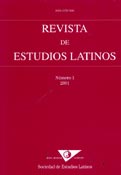El uso del sufijo latino -izare (-issare, -idiare) en los inicios de la literatura cristiana
DOI:
https://doi.org/10.23808/rel.v10i0.87837Palabras clave:
suffix; morphological loan; Christian literature; verbs.Resumen
Desde que aparecen los primeros verbos latinos en -izare (-issare, -idiare) en las comedias de Plauto, el sufijo se vuelve cada vez más productivo en la lengua. Hoy, sigue siendo un recurso frecuente en la formación de nuevos verbos en las lenguas romances. El presente trabajo tiene como objetivo explorar el uso del sufijo -izare (-idiare) en la literatura cristiana de los ss. III -VI d.C. Nos centraremos en los textos y contextos en los que surgen los verbos dotados del sufijo en este periodo, así como la variante del sufijo empleado en cada caso (-izare o -idiare). Examinaremos la manera en la que se utiliza el sufijo para crear nuevos verbos y el valor semántico que lleva. Se prestará atención particular a los verbos que identificamos como creaciones dentro de la lengua latina (pulverizare ‘pulverizar’, martyrizare ‘convertirse en mártir’) puesto que son estos los verbos que nos proporcionan información importante acerca del valor que tenía el sufijo para el latinohablante de la época.
Descargas
Descargas
Publicado
Cómo citar
Número
Sección
Licencia
Derechos de autor 2010 Revista de Estudios Latinos

Esta obra está bajo una licencia internacional Creative Commons Atribución-NoComercial-SinDerivadas 4.0.
Los originales publicados en las ediciones impresa y electrónica de esta revista son propiedad de las personas autoras de los mismos y se podrán difundir y transmitir siempre que se identifique la fuente original y la autoría en cualquier reproducción total o parcial de los mismos, y siempre que no tengan una finalidad comercial.






